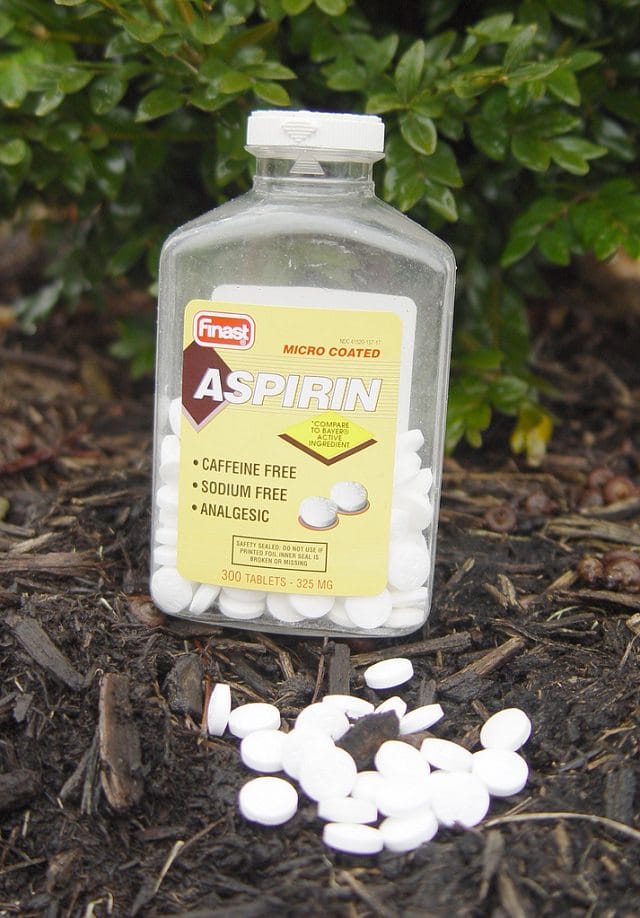Aspirin tablets can be used for growing healthy and productive plants, and it really WORKS. Here’re some of the best ASPIRIN uses in the garden!
1. Increases the growth and productivity of plants
At the University of Rhode Island, gardeners made a solution containing 4 crushed aspirin tablets and 4 gallons of water and then sprayed the solution on their vegetable gardens every three weeks throughout the growing season. At the end of the season, they found that the treated plants grew more quickly and were more fruitful than the group that was left untreated.
They concluded that Aspirin leads to increased vitamin C content and greater growth in plants.
The science behind this claim
Aspirin contains an active ingredient known as salicylic acid. It is derived from willow bark. This acid enhances the immune system of plants (Plants prepare it naturally but in lower amounts) especially those in the nightshade family. Plants subjected to it get the boost in immunity power, which helps them in combating with pests and microbial attack and prevents the formation of fungus leading to increased growth rate of plants. Visit the New Scientist to learn more about this in detail.
Also Read: Ways To Keep Your Plants Healthy
2. It helps plants combat fungal diseases
Verticillium and fusarium wilt are common fungal diseases widely distributed in soil and can wipe out an entire crop in a matter of days. Fortunately, according to a recent study by the US Department of Agriculture, the use of aspirin spray can significantly reduce the spread of fungus on the plant. It is also helpful in blight. Visit the Dailymail to learn to learn how Aspirin helps tomatoes!
The science behind this claim
Apparently, plants produce small amounts of salicylic acid naturally especially when they are stressed. The salicylic acid creates a systematically acquired resistance protecting the plants against microbial attack, drought, and even insect attack. Since salicylic acid is the active ingredient in Aspirin, when a solution of Aspirin is sprayed on the plants, the amount of salicylic acid in the plants is increased, which in turn boosts their immune system protecting the seedlings and plants from soil-borne diseases, bacteria, and fungi.
Gardeners can spray their plants with a solution of an aspirin tablet mixed in distilled water. The drug is especially effective in warding off diseases in the nightshade family which include tomatoes or potatoes. You can also soak the seeds in the aspirin solution just before sowing to improve germination.
3. Help cut plants and flowers to last longer
Are you wondering how you can keep your cut flowers looking fresh for a long time? It is possible by adding Aspirin to the vase water. To achieve this, crush an aspirin tablet, dissolve it in water and add the solution to a vase. Visit Lifehacker to learn more!
The science behind this claim
According to Judy Jernstedt, a professor in the plant and soil department at the University of California, Davis, the salicylic acid reduces the production of ethylene. With reduced ethylene present, floral wilting is delayed, and the cut plants can last longer.
Also, the anti-fungal properties of salicylic acid that dissolve into the vase water slows down the growth of mold, which, if it enters the flower stem, can clog the vascular tissue leading to the death of the flower. For longer-lasting fresh flowers, be sure to change the water regularly.
4. Propagate plants from cuttings successfully
Rooting hormone helps in propagating plants from cuttings and using it improves the success rate. Take a cup of distilled water and dissolve one uncoated aspirin tablet and then keep the cut end of the plant in this rooting solution for a few hours before planting. It’ll work!
The science behind this claim
Instead of using willow bark, which contains growth hormones, you can use Aspirin to prepare your own rooting solution. It contains the same salicylic acid that is found in willows and works the same.
How to Use Aspirin in the Garden
You should be careful when using Aspirin in the garden as too much can burn or damage the plants. Improper use may lead to the development of brown spots that makes them appear to have burnt foliage. This guide on how to properly use Aspirin in the garden can help prevent any damage to the plants.
The Right Dosage
The right dosage of Aspirin should not be more than a tablet for each liter of water. Begin by crushing the tablet and ensure it is well dissolved before spraying. *It has been observed by gardeners that Aspirin dissolves well in distilled water!
When spraying, do it in the morning as plants tend to absorb best at this time. Also, spraying in the morning helps to avoid harming the beneficial insects such as bees and other pollinators, which are active later, and it gives the plants a chance to dry too.
You should also pay attention to the response of the plants to the treatment as not all plants are suitable for this. Plants in the nightshade family, such as tomatoes, peppers, potatoes, and eggplants, benefit significantly from the aspirin regimen.
Pin it!







How strange. I am looking this up because last night I dreamt that someone was teaching a child to put willow bark powder in when planting potatoes and that this protected the crop.
How amazing!:-D Have you had dreams like that before?
I used a tablet of asprin in 1 litre of water for my mint as an experiment.
Unfortunately ,next day, I discovered that the mints showed signs of asprin burn(brown patches on leaves).Some even died.
I think asprin doesn’t help mints or did I used too much?
I have made willow water before for my house plants and cuttings and never no problem. I was looking up using aspirin because I do not know anyone with willows any longer.
You may have made it too strong. I am finding with some research that 2 regular aspirins per 2 gal. of water. Also if you are in the south and the mint was getting full sun that might have had an impact on the burning of your leaves.
What time of day did you spray the mint? Best time to spray is in the evening at dusk when the sun has gone down or when the plant is in the shade for the night. I never water when the sun is shining on my plant leaves. If I feel it totally necessary to water because a plant is wilting I make it a point to water at soil level only.
Maybe you should have used to the ratio of 1 Gallon of water. Most mixtures use that amount
The author said one tablet for 1 litre of water,Stevicate is using 2 tablets for 2 gallons of water.Which one is the best ????
I’m curious too about the litre and gallon difference. Which is the right one?
One gallon=450 ml ,,,,,1 litre= 1000ml .
1 Gallon = 4.5 lt: 1lt =1000ml
1 GAL = 3.89 LITERS
What about the grams, ask because a single table can be 50 up to 200g
one US gallon would be composed of 3.79 liters while the UK gallon would have 4.55 liters
A liter equals a little more than a quart
a gallon equals 4 quarts
What’s the milligram of aspirin do you use? This artle doesn’t tell you. 81mg, 325mg or 500mg?
I know it’s been a few years since you asked but just for anyone else, I have always used 81mg tablets
did aspirin is suitable for maize, castor and safed musli plant’s…
and with the npk powder.
I am going to try it. Hope it works because I just purchased 5 packets of aspirin 😂
I am going to use 2 tablets in a watering can (9 litres) id rather have it on the weak side than too strong, this way they are still getting a boost of salicylic acid without the worry of damaging my plants
Great advice. I use a spray with aspirin for my tomatoes every year. I did a test one year and sprayed 4 with it and left one that didn’t have it. Guess which plant got leaf spot… :)
I am going to try the aspirin spray on my tomatoes and my SHOW roses. Logical it sounds like a wonderful idea. I am so excited to find this idea! It is spring here in GA so it is time to spray the roses now and the tomatoes later.
I mixed 2 aspirin into 2gal of water, sprayed my peppers, eggplant, tomato and my flowers. This is the first time I have done this,OMG I hope they don’t die.
Hello there 🙋🏻♀️ How did it work on your plants?F
Asprin has a natural PH of 7 helps plants absorb micro nutrients more easily I dilute it in watering can Don,t spray it on leavs
Gosh I sprayed the leaves of the plants also. I pray that the rain falls and they don’t burn. Going and hose them down
From what iI have seen via video, they spray the foliage with the mix and get great results.
Y’all, don’t spray it. Just feed it directly in the soil. I don’t know how this went so viral. I discovered this and won 3rd in a GA science fair in 1997 when I fed a tomato plant aspirin water over a period of time and it grew twice the size of the tomato plant to which I fed miracle grow on the same schedule. I just wrote an email to the University of Rhode Island Gardeners to find out the origins of this study that they did, because I have a feeling that whoever the gardener was that came up with this got the idea somehow from my project.
Anyway, I didn’t spray the leaves. I just gave the plant aspirin water instead of miracle grow water, but in the same way you would feed miracle grow. I believe I did 1 crushed aspirin per 32 oz. warm tap water to dissolve, cooled the water before feeding.
Thanks for your comment! I think I will do a side-by-side comparison with foliar and root feeding. Found your comment in a Google search. Thanks!
I am a paramedic with a small garden the only reason am on this page is because i dreamt someone showing and telling me to use use Asprin on my vegetables i didnt believe it until i googled it there it is.i actually thought it was crazy
Am not yet clear
Please how many tablets can dI solved in a litre of water
Can you use aspirin on roses to help in the fight against black spot please?
Hi there !
First of all, thank for nice information.
Can you please guide me if you can use aspirin spray while you are regularly fertilizing your plant ?
this has been a great information for me; never thought that a drug that is meant to be consumed by human can be this beneficial to our plants. its crazy to believe but that’s just the reality; however i would like to know the dosage and the method of application because its contradictory based on the foregoing comment and reactions
“…never thought that a drug that is meant to be consumed by human can be this beneficial to our plants… ” by Sopurunkem
Huh?
Asprin is derived from plants.
Specifically aspirin = acetylsalicylic acid derives from the salix = willow tree.
So it has been benefiting plants for millions of years before humans.